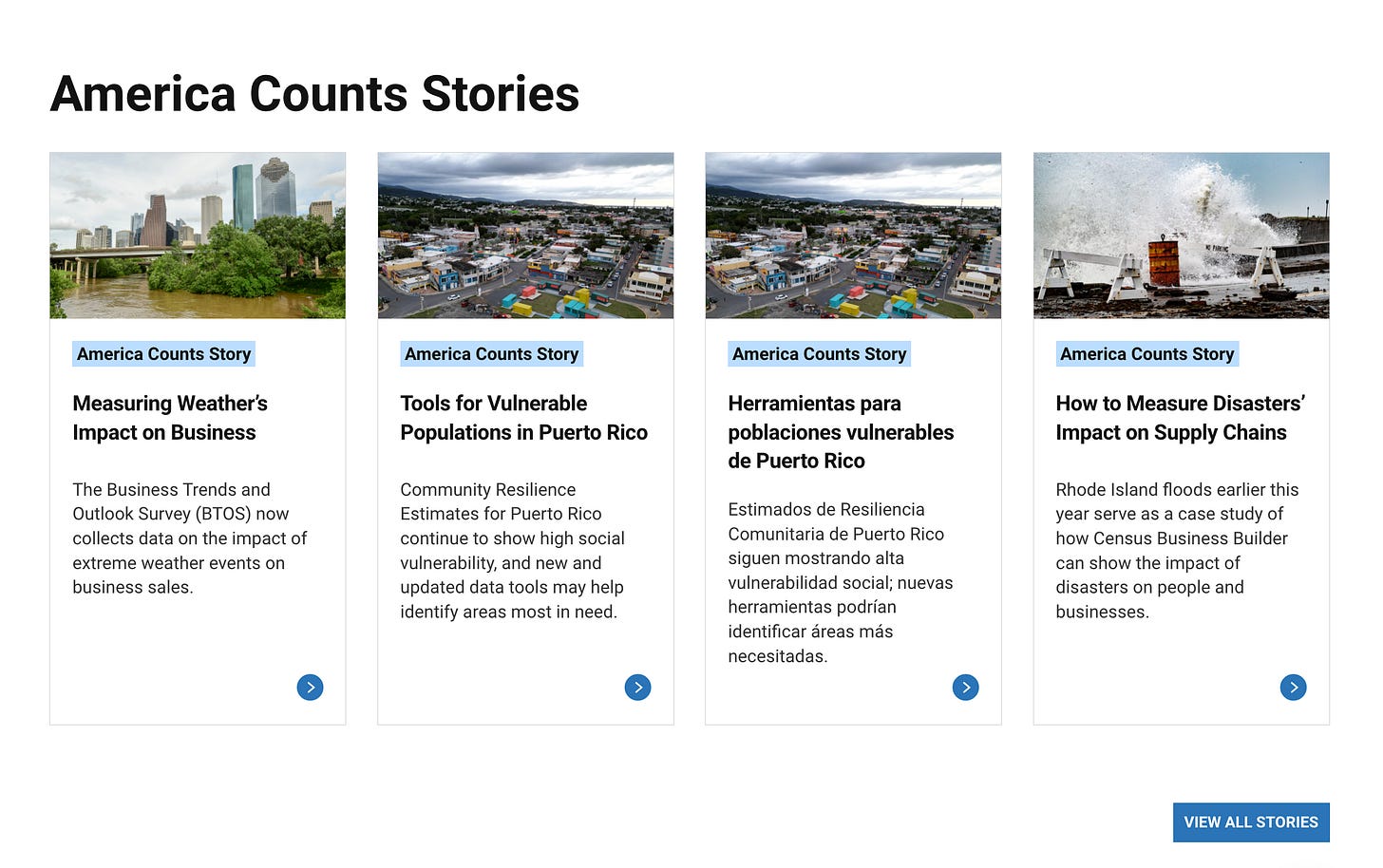In light of this post’s relevancy to Hurricane Helene recovery efforts, I am releasing this content as free to the public. The newsletter at the end of the month will be exclusive to paid subscribers.
After disaster strikes, communities need many things to make sure the basic needs of their residents are met: food, water, shelter, clothing, internet - to give a non-exhaustive list.
There is something else that is crucial to understanding a disaster’s impact and carrying out recovery efforts: data. This may not immediately come to mind when we think of disaster recovery, but it serves many important purposes and is not only useful for government agencies. As an example, an organization such as a library may need to provide specific data to obtain disaster relief funds or other support. Aid organizations may need data on vulnerable populations to target their efforts. Data is necessary for emergency planning, preparedness, and responses.
One useful source of local population data in the wake of disasters is the Emergency Management Hub, run by the U.S. Census Bureau. Let’s take a look at it.
Access the Emergency Management Hub by going directly to disasters.census.gov, or to census.gov —> Menu —> Topics —> Emergency Management/Disasters.
If you click on “View Events”, you’ll be taken to a page that lists different events and emergencies that the Census specifically tracked and provided resources for. However, I suggest continuing to scroll down on the homepage first, where you’ll find links to specific events organized by recent occurrences and type of event.
While 2024 hurricanes take center stage under the recent events carousel, the Census tracks many different types of disasters including wildfires, air quality, extreme heat, tornadoes, floods, and pandemics.
You can click on a specific emergency to see a synthesis of data tools and related government resources. For example, if you click on “Learn More” under the 2024 Hurricane Helene listing, you will be directed to a summary page that provides an overview of the storm.
Scroll down to see links to updates provided by the Department of Homeland Security and FEMA.
Next, there is a “National News” section that provides direct links to FEMA disaster declarations and approvals by President Biden and the governors of the impacted states.
The Census also provides a “Relevant Data Tools” section, which may vary depending on the emergency type. The featured tool for Hurricane Helene is the “My Community Explorer”, which is intended to help identify underserved communities. You can also use this tool to explore vulnerability related to natural disasters and other emergencies. Also listed are the Census Business Builder, the Census Business Builder Report Quick Lookup, and the OnTheMap for Emergency Management.
These are complex tools that have learning curves. Luckily, the U.S. Census Bureau features tutorials for all of the above tools on their YouTube channel.
At the bottom of the page on Hurricane Helene (and the pages for the other emergencies, as well), there is a list of Related Sites & Resources that may be helpful to your research.
Return to the Emergency Management Hub homepage to access a few more resources listed under the “View Emergencies by Event Type” section. Here, you’ll see the My Community Explorer data tool featured once more, along with some others that weren’t on the Hurricane Helene page (e.g. Census COVID-19 Data Hub).
You’ll also see the “America Counts Stories” section. These pieces are informative because they show how Census data tools answer important questions about emergencies. They also feature some summary data and highlight important functionalities of the data tools.
There are three more sections to close out the resources on the Emergency Management Hub:
Overviews of Census surveys and programs that contribute data to the aforementioned tools:
Press releases and other relevant news about Census data:
Finally, links to some data visualizations and downloadable graphics that help enhance general understanding of certain topics:
Conclusion
If you need to access population data related to Hurricane Helene or other emergencies, the Census Bureau’s Emergency Management Hub is one place to start. If you know anyone who may benefit from this newsletter issue, please consider sharing it with them!
Until next time,
The Civic Librarian













Thanks. I'll just save this info for when it is our turn.